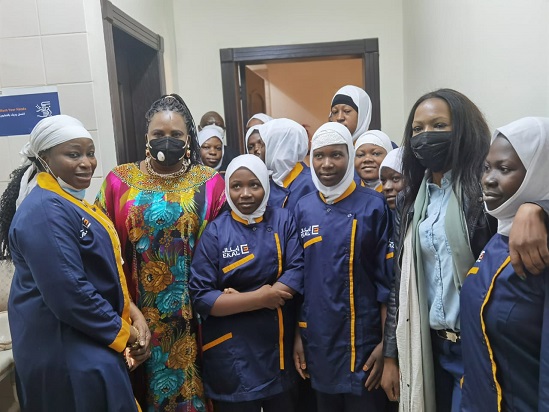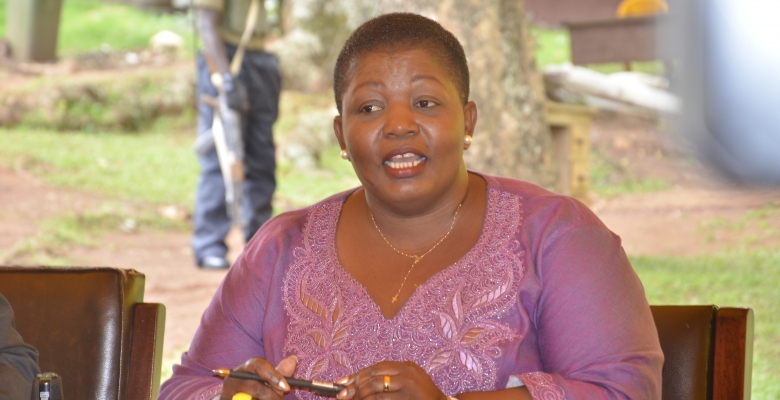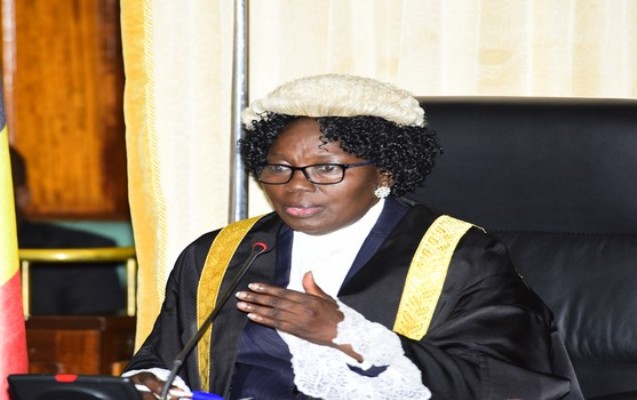Minister Amongi (second left) with Ugandan girls at the EKAL facility in Saudi Arabia on Tuesday
The Ministry of Gender, Labour and Social Development and authorities in Saudi Arabia have agreed to set up a joint technical committee to monitor the safety and well-being of Ugandan migrant workers.
This comes at a time the country is trying to tighten its grip on labour recruitment companies through enforcing the Employment (Recruitment of Ugandan Migrant Workers) Act 2021 and also follow on the implementation of the Bilateral Labour Agreement Uganda and Saudi Arabia signed in 2017.
According to the Gender ministry, the establishment of a joint technical committee is timely. The committee , expected to be made up officials from both countries, will be charged with monitoring the implementation and compliance with the 2017 bilateral agreement which aims at ensuring safe and decent labour externalization.
Betty Amongi, the Gender minister, told the media on Wednesday that setting up the committee by June this year is one of the key resolutions made during her week-long visit to Saudi Arabia last month. The visit run from January 23-28.
She says the committee is important because there are over 140,000 Ugandan migrant workers in Saudi Arabia, making the Middle Eastern country a key destination for different categories namely housemaids, security guards and cleaners. Amongi says Ugandan migrant workers in the Middle East make remittances of about 900 million US Dollars, about shillings 3 trillion per year.
As a result, governments must ensure safety of migrant workers who have several challenges that “necessitated my visits to the major destinations of our young people in the Middle East with a view to finding durable solutions.”.
Amongi says the absence of a Joint Technical Committee, as provided for in the Bilateral agreement, has made it difficult to address challenges such as the irregular transfer of domestic workers’ services from one employer without informing the Saudi ministry of Human Resources and Social Development and licenced Ugandan recruitment companies. “This makes it difficult to monitor the migrant workers some of whom unsuspectingly find themselves getting into unfavourable and often risky working conditions,” says Amongi.
These risky working conditions include; delayed or non payment, long working hours while some migrant workers’ travel documents are confiscated or denied the right to return home.
She adds that some workers are forced to sign extensions to contracts under unfavourable conditions and get any extension outside the original two-year contract with a new employer means the Ugandan recruitment company loses track and responsibility for the affected workers.
Some Ugandans led by Mark Ssengondo, who were deported last November made similar complaints. Ssengondo says when his two-year contract as a cleaner in a hotel expired, he was hired by another Arab to work as a cleaner at his home. However, he was taken to various building sites as a porter and would sometimes work for over 18 hours without compensation for working overtime. Another deportee, aged 24 years, noted that her employer locked her up in a room for eight months after she demanded for payment of her salary arrears of four months.
Amongi says such perpetrators usually go unpunished for breaching terms and conditions of workers’ contracts. Each worker is entitled to adequate medical services paid by the employer, access to telephone, internet and other communication services and meals among others.
As a result, the joint technical committee is expected to established before December 2022 when the bilateral agreement signed in 2017 will expire.
The committee will ensure the establishment of elaborate joint reporting and procedures for handling complaints, and other cases.
While in Riyadh, Amongi says she interacted with officials from the Uganda Embassy, senior Saudi officials including Ahmed Sulaiman the Saudi minister of Human Resources and Social Development and Dr. Adnan Alnuaim the Deputy Minister for International Affairs.
She also met Ugandan migrant workers including those in distress and housed at a shelter in Riyadh under the embassy, Saudi recruitment companies and Sakan a private company contracted by the Saudi government to manage migrant workers and to provide accommodation facilities.
Amongi adds that the Ugandan government will also follow up on recruitment of underage workers, that is those below 21 years, forgery of medical reports namely Covid-19 test results, workers concealing pregnancies, failure of recruitment companies to conduct pre-departure orientation and training.
She says officials from both countries will meet in three months’ time to assess progress towards resolving the challenges that been jointly identified.
-URN





